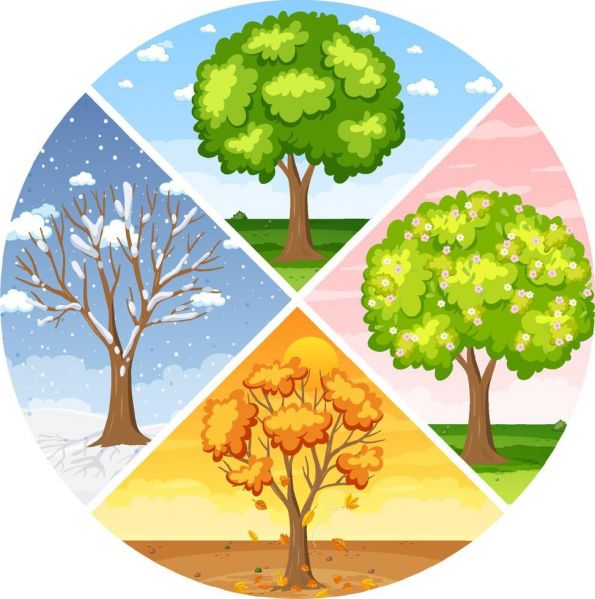THE SOUTHWORTH PLANETARIUM
70 Falmouth Street Portland, Maine 04103
(207) 780-4249 usm.maine.edu/planet
43.6667° N 70.2667° W
Founded January 1970
2022-2023: XIX
Sunrise: 6:29 a.m.
Sunset: 6:36 p.m.
Civil twilight ends: 7:05 p.m.
Sun's host constellation: Virgo the Maiden
Moon phase: Waning crescent (5% illuminated)
Moonrise: 4:51 a.m. (9/24/2022)
Moonset: 6:26 p.m. (9/24/2022)
Julian date: 2459846.16
"We've got to pause and ask ourselves - how much clean air do we need?" -Lee Iacocca
THE DAILY ASTRONOMER
Friday, September 23, 2022
Quiz # 4: The Four Seasons

Now that we're in the first full day of astronomical autumn, we thought it would be a spiffing idea to offer a quiz about the seasons. Not just one, but all: the summer that was, the autumn that is, the winter, which is imminent, and the spring that seems far too far away. Consider this quiz a celebration of the year's four quadrants, each of which -at least at this latitude- is distinctive, inspiring and lovely (ish).
1. Which season -in the northern hemisphere- is the longest?
a. spring
b. summer
c. autumn
d. winter
2. The Sun appears to occupy the constellation _____________ on the autumnal equinox.
a. Virgo
b. Pisces
c. Sagittarius
d. Taurus
3. We experience different seasons because Earth is tilted relative to the plane of its orbit. This tilt, called the obliquity, measures __________ degrees.
a. 22.4
b. 23.1
c. 23.4
d. 24.7
4. _______________ composed "The Four Seasons" between the years ___________.
a. Antonio Vivaldi; 1678-1681
b. Gustav Holst; 1814-1822
c. Antonio Vivaldi 1718-1720
d. W.A. Mozart 1778-1779
5. The Sun appears to occupy the constellation _____________ on the vernal equinox.
a. Virgo
b. Pisces
c. Sagittarius
d. Taurus
6. Which season contains the greatest number of federal holidays?
a. spring
b. summer
c. autumn
d. winter
e. coming up with four answer choices has never been so wonderfully easy.
7. The Sun appears to occupy the constellation _____________ on the winter solstice.
a. Virgo
b. Pisces
c. Sagittarius
d. Taurus
8. The ___________ were the Greek gods/goddesses of the seasons
a. Horai
b. Themi
c. Dioscuri
d. Bacchae
9. If the precise time of the summer solstice for a given year is 1:00 p.m. June 21st, what will be the approximate time of the summer solstice for the following year, if it isn't a leap year?
a. 5:00 a.m. June 21st
b. 7:00 p.m. June 21st
c. 4:30 p.m. June 21st
d. 1:00 p.m. June 22nd
10. The Sun appears to occupy the constellation _____________ on the summer solstice.
a. Virgo
b. Pisces
c. Sagittarius
d. Taurus
ANSWERS
1. Which season -in the northern hemisphere- is the longest?
b. summer
Yes, believe it or not, summer is our longest season. Astronomical summer lasts about 93 days, whereas winter, the shortest season, lasts approximately 88-89 days. Earth reaches aphelion, its point of greatest distance from the Sun, in early July. Consequently, it moves most slowly in its orbit around and requires more time to travel between the summer solstice and autumnal equinox point than it does to move from the winter solstice to the position of the vernal equinox.
2. The Sun appears to occupy the constellation _____________ on the autumnal equinox.
a. Virgo
3. We experience different seasons because Earth is tilted relative to the plane of its orbit. This tilt, called the obliquity, measures __________ degrees.
c. 23.4
4. _______________ composed "The Four Seasons" between the years ___________.
c. Antonio Vivaldi 1718-1720
5. The Sun appears to occupy the constellation _____________ on the vernal equinox.
b. Pisces
6. Which season contains the greatest number of federal holidays?
d. winter
Winter - 4 New Year's Day; Martin Luther King Junior Day; Washington's Birthday; Christmas
Spring - 2 Memorial Day; Juneteenth (Remember we're referring to astronomical seasons.)
Summer - 2 Independence Day; Labor Day
Autumn - 3 Indigenous People's Day/Columbus Day; Veteran's Day; Thanksgiving
7. The Sun appears to occupy the constellation _____________ on the winter solstice.
c. Sagittarius
8. The ___________ were the Greek gods/goddesses of the seasons
a. Horai or Horae
,_1894.jpg%22&N=Edward_John_Poynter_-_Horae_Serenae_(detail),_1894.jpg)
Horae Serenae by Edward Poynter
9. If the precise time of the summer solstice for a given year is 1:00 p.m. June 21st, what will be the approximate time of the summer solstice for the following year, if it isn't a leap year?
b. 7:00 p.m. June 21st
10. The Sun appears to occupy the constellation _____________ on the summer solstice.
d. Taurus
To subscribe or unsubscribe from the Daily Astronomer: